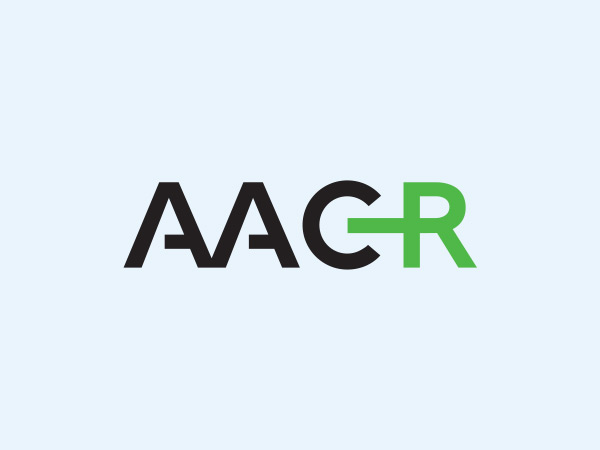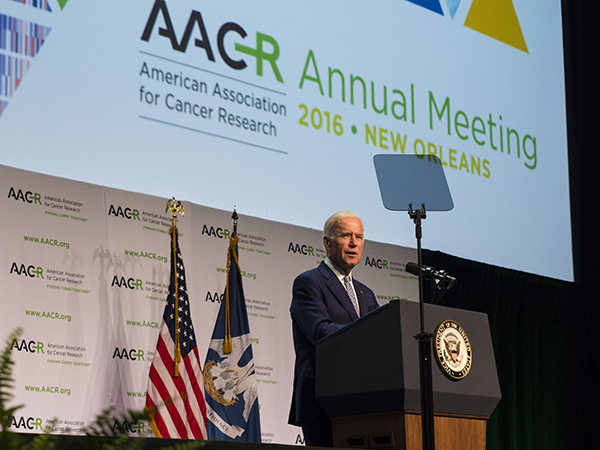Annual Meeting 2022: Undergraduate Students Get the Scoop from Early-career Researchers
After days and weeks spent printing posters and finalizing their presentations, 77 undergraduate students, representing 49 institutions from around the United States, eagerly arrived at the American Association for Cancer Research (AACR) Annual Meeting 2022, ready to share their research, forge new connections, and solicit career advice from some of the best minds in cancer science.
The marquis event for these students was the Undergraduate Student Caucus and Poster Competition, which provides an exciting opportunity for undergraduates to present their own work and receive feedback from established cancer researchers. The students receive complimentary registration for the Annual Meeting, where they compete for prizes funded by the Margaret Foti Foundation.
Foti, the AACR’s chief executive officer, welcomed the students to the Annual Meeting in this year’s Opening Ceremony, noting that their attendance is a welcome part of the AACR’s efforts to foster the next generation of cancer scientists.
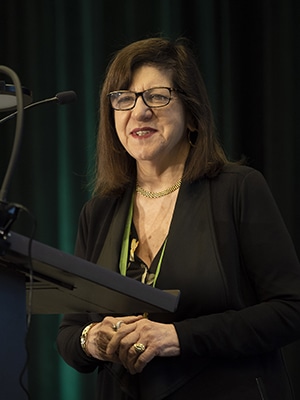
“These students are the new blood of cancer research, and AACR has supported their participation in the Annual Meeting for the past 25 years,” Foti said. “These individuals represent the future of cancer research, who will make up the next generation of physicians, investigators, and scientific leaders.”
Foti noted that in addition to the undergraduates, 10 high school students had abstracts accepted for presentation during the Annual Meeting.
“This is an extraordinary achievement that gives us all so much hope for the future of cancer research,” Foti said. “Your contributions are going to help us achieve our goal of conquering all cancers.”
During the poster competition, a panel of early-career researchers, just a few steps ahead of the undergraduates on their paths in cancer research, led a lively discussion of what might come next for the students as they learn to navigate career opportunities and obstacles.
Here are some key takeaways:
If at first you don’t succeed …
The panelists were clear that in a competitive field, most cancer researchers face rejection at some points, whether from a graduate program, a grant opportunity, or a potential new job.
Kristin A. Altwegg, MS, PhD, shared that after she completed her bachelor’s degree, she was rejected from a registered dietician program. At the time, she was upset. Today, she says, “If you take a look at the ‘nos,’ they give you perspective and you can see that they helped you get where you wanted to go.” Just a couple of weeks ago, she earned her PhD in integrated biomedical sciences at UT Health San Antonio, focusing on treatment-resistant breast cancer.
Channel your curiosity
Panelists encouraged the students to remain curious, and to remember that any question that stirs their passion is worth examining.
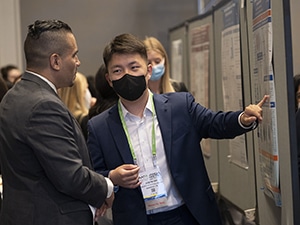
Jose G. Trevino, MD, chair of the Division of Surgical Oncology at the Virginia Commonwealth University School of Medicine and surgeon in chief at VCU Massey Cancer Center, was the moderator for the discussion, and told the students about a job candidate who had a passion he didn’t fully appreciate when he first met her.
“Her mom was a dental hygienist, and this particular student was really passionate about oral health,” he recalled. He admired her enthusiasm and brought her into his lab. Since then, the oral microbiome has become a fertile area of cancer science, and she conducts research in that arena.
Cultivate strong mentor relationships
All the panelists expressed deep appreciation for mentors, and encouraged the students to develop this invaluable resource, for personal guidance as well as professional advice.
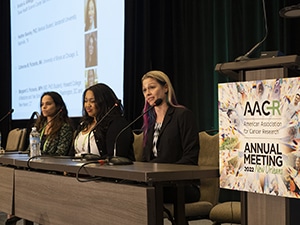
“Maybe you have a career mentor, but also a spiritual mentor, and someone else who helps you work out questions about your work-life balance,” suggested Heather K. Beasley, MS, PhD, a postdoctoral student at Vanderbilt University.
This year’s Annual Meeting Program Chair, Marcia R. Cruz-Correa, MD, PhD, said she remembers feeling intimidated when she first sought mentors, but now encourages students to be politely persistent as they try to establish relationships.
“Ask three times,” Cruz-Correa said. “Everyone gets busy … maybe they didn’t see that first email.”
Seek out fruitful opportunities
As students balance their coursework and research responsibilities with professional opportunities, it can be difficult to know how to prioritize.
Margaret S. Pichardo, MD, PhD, MPH, suggested that when considering new ventures, students could consider which opportunities have “deliverables”—concrete results that will benefit them in the long term.
“Will your project lead to you attending a conference, or being listed as an author on a paper? That type of work will help your CV and can lead to further opportunities,” she said.
Ask for help when you need it
As Beasley took a break from her lab work to take care of her newborn baby, she realized she needed backup to monitor the cells she was using in her research on breast cancer.
“I knew I could keep up with some work from home, but I reached out to some colleagues and said, ‘Guys, can you please help me keep my cells alive?’” Asking for help enabled her to relax and take care of her baby, and helped her acknowledge that no one can always do it all, she said.
expand your horizons
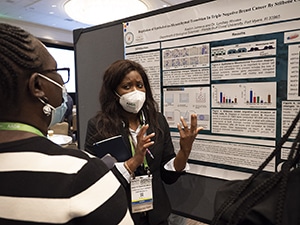
Pichardo was born in the Dominican Republic, and as an undergraduate, she felt drawn to study abroad. Throughout her schooling, she took several opportunities to study overseas, including research opportunities in South America. She believes these experiences will enrich her work as a cancer scientist.
“You can build your passions into your academic work,” she told the students.
This month marks National Cancer Research Month, the AACR’s annual global awareness campaign highlighting the importance of cancer research. We are thrilled to support initiatives like the Undergraduate Poster Competition, which will undoubtedly benefit the next generation of cancer researchers. Our website features more information on this year’s winners.
To learn more about National Cancer Research Month, see our website and join the conversation on Twitter via the hashtags #NCRM22 and #ResearchSavesLives. To learn more about opportunities for undergraduates and high school students, see this video.

